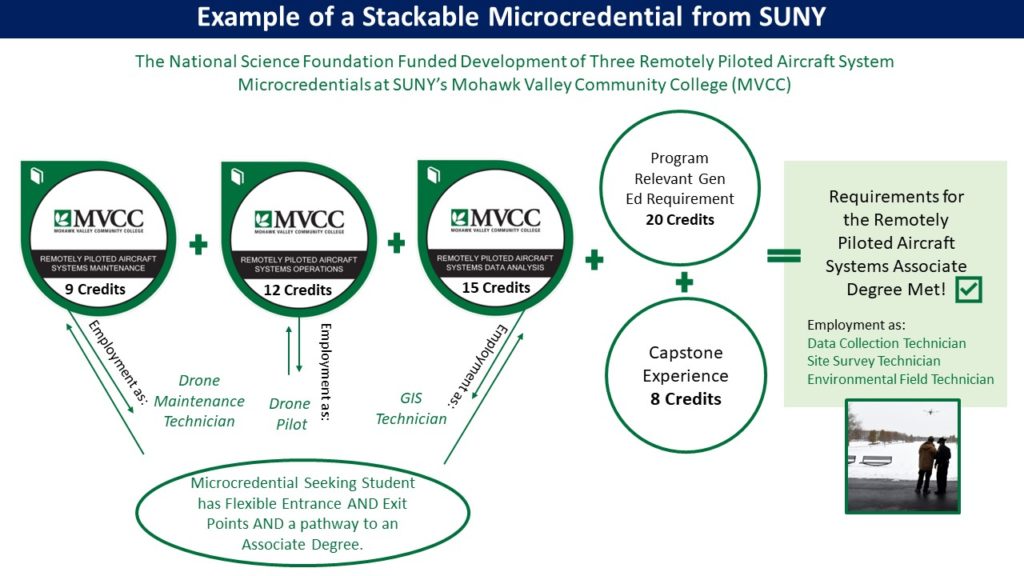Editor’s note: eCampus News is exploring the future and potential of microcredentials in a multi-story series. Check back each week for fresh perspectives from educators and industry experts.
Later this month, the State University of New York (SUNY) will represent the United States in the Global Dialogue on Microcredentials, sponsored by the European Union’s Erasmus+ Programme. SUNY is the nation’s largest comprehensive system of higher education with 64 institutions (community colleges, technology colleges, comprehensive colleges, and doctoral institutions including R1 research and medical universities) located across New York State and its microcredential program continues to be recognized as an exemplar.
SUNY currently offers 435 microcredentials in 60+ disciplines across 31 campuses, each grounded in a 2018 system-wide policy developed with broad input from across the University. Microcredentials are smaller credentials that can be completed in months, not years, and they tend to be more narrowly focused. SUNY defines high-quality microcredentials as those that provide the earner with academically rigorous instruction, immediate in-demand skills, and, wherever possible, a pathway to additional credentials.
One of the early higher education adopters of microcredentials, SUNY’s program centers on: academic quality; alignment to industry and professional standards; pathways to certificates, initial and/or advanced degrees (stackability); formal recognition of completion via a transcript and digital badge (portability); and recognition of microcredentials for multiple audiences. These criteria are the hallmarks that nearly every national/international report on the subject identify as priority. Faculty wanted to ensure that microcredentials would have the same quality as SUNY certificate and degree programs and so, on campus, microcredentials follow a formal process that includes faculty governance—while still encouraging faculty innovation and responsiveness. Now four years in—with expansive growth in the past year as more campuses saw microcredentials as a means to serve learners, communities, and businesses impacted by the pandemic—SUNY’s policy-driven quality framework for microcredentials has proven to be effective.
The most common SUNY microcredential consists of three courses, but there are microcredentials that have two to five courses, and they can include an internship or industry certification. There are microcredential series—beginner, intermediate and advanced, and also non-credit instruction meant for professional development. Innovative microcredentials are designed with multiple entrance and exit points (see diagram below) and highlight progressive pathways.

In SUNY’s current portfolio of microcredentials, 65% of SUNY microcredentials can be stacked to registered certificate and degree programs including associate, bachelors, master’s, and doctoral degrees (philosophy, pharmacy, dental surgery, optometry and medical doctor)! SUNY campuses have worked with hundreds of businesses, local, regional and state workforce entities, communities, school districts, existing students, alumni, and more in developing their respective microcredential programs with campus faculty.
SUNY recently launched a System-wide searchable microcredential directory with related plans for growth. What makes SUNY’s approach to microcredentials appealing is that their design is applicable to multiple audiences: existing students, SUNY employees and alumni, incumbent workers, and professionals at all levels (business/industry partners), P-12 and community partners, and importantly, those unemployed or under-employed who need high-quality credentials to move forward.
The latter audience is a particular area of focus for New York State, reflected by its first-ever inclusion of part-time financial aid, via the New York State Tuition Assistance Program (TAP), for “non-degree credentials,” in the Fiscal Year 2023 State budget. Non-degree credential is an increasingly used term to refer to recognized learning that takes place outside of a degree program and will include both for-credit and non-credit microcredentials at SUNY’s community colleges that align with significant industries in the state.
When we talk with adult learners about opportunities at SUNY, two of the most common concerns are cost and fear about going back to school after a long-time away. To be able to tell these prospective students about available financial support and that they can start with a smaller credential addresses both concerns from the start. Further, SUNY microcredentials are taught by SUNY faculty and students have access to the library and related supports. In a very real sense, this program is about meeting students where they are and providing multiple pathways to success; the new State support means that SUNY will be able to reach more New Yorkers.
SUNY’s program is of course informed by national and international standards and the latest industry advancements, but it also closely considers local, regional and state-wide priorities. The bulk of the microcredential work is focused on building intellectual capital across New York State—current residents and those attracted to what SUNY and the state have to offer—to support New York’s communities, to fill open and emerging jobs, and to upskill/provide professional development so the current workforce can be responsive and adapt to change.
The benefits of SUNY’s approach extends to currently enrolled students too. Microcredentials within their degree program can immediately recognize mastery of particularly complex coursework (the physics major taking an Astro/Particle Physics microcredential) or the latest developments in a given field or profession (from heat pump installation and maintenance, to programming with Python). Similarly, microcredentials in a discipline that is complementary to a student’s major (the accounting major who takes a microcredential in cybersecurity) can provide immediate recognition of in-demand skills. In both cases microcredentials can help students gain a better internship or part-time job, and upon graduation help them to stand apart from the competition.
The focus that microcredentials provide on skills and competencies mastered via a digital badge has been illuminating. Students report being more comfortable talking about, articulating what they have learned, and sharing examples of related work. This intentional discussion can of course occur when a digital badge is not involved too.
Microcredentials for existing students, with a focus on professional development, are attracting campus employees and alumni. Microcredentials also support existing partnerships beyond business and industry, including local school districts (specialized training for school leaders) and communities (skills for parents of students with disabilities).
SUNY views high-quality microcredentials as a natural extension of its work, part of the myriad ways that it has, over time, shifted to accommodate changing learner needs and industry expectations, and yes, even to respond to an international pandemic. Yet the connection from microcredentials to additional credentials, including degrees, remains significantly important. SUNY’s responsibility is to provide access to high quality education across the lifetime of New Yorkers—we are excited about the pathways and new connection points that microcredentials provide to our vibrant learning communities.
- 8 top trends in higher education to watch in 2024 - April 16, 2024
- Defining a path to equitable AI in higher education - April 12, 2024
- Leveraging AI-driven edtech for continuous improvement in higher ed - April 11, 2024

